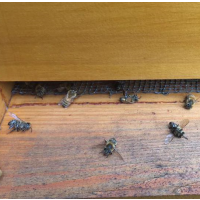Millions of Bees Killed During South Carolina Pesticide Assault on Zika-Prone Mosquitos
 Bees killed in pesticide attack on mosquitoes, Aug. 2016 (photo: Flowertown Bee Farm and Supply)
Bees killed in pesticide attack on mosquitoes, Aug. 2016 (photo: Flowertown Bee Farm and Supply)
By Sean Duffy, Courthouse News Service
(CN) — South Carolina's efforts to kill mosquitoes that can carry the Zika virus has likely also killed millions of bees in the state.
The spraying of pesticides was targeting the Aedes albopictus and Aedes aegypti species of mosquito, which can carry and transmit the virus.
Hives of bees dropped dead in Dorchester County after the area was sprayed Sunday morning with Naled, a common insecticide that kills mosquitoes on contact.
Juanita Stanley, co-owner of Flowertown Bee Farm and Supply in Summerville described the devastating effect of the aerial spraying.
"My bee yard looks like it's been nuked," Stanley told the Associated Press.
She said the farm lost nearly 2.5 million honeybees from 46 hives as a result of the spraying.
Naled has been used for nearly six decades, primarily to control adult mosquito populations.
Local officials approved spraying in Dorchester County given the increase in mosquitoes due to humidity, floods, rains, a mild winter and an extremely hot summer.
"The aerial application will allow country officials to target areas wherein the level of demand cannot be addressed with ground spraying and larval control alone," officials from Dorchester County said in a statement released before the spraying.
South Carolina had a total of 43 confirmed Zika cases as of Aug. 26.
Officials may have overlooked the fact that Naled is highly toxic to bees, though it poses no threat to people or animals.
"My wife called a short time after the flyover and said, 'We have a mass kill,'" hobby beekeeper Andrew Macke told the AP. "We have thousands and thousands of bees dead all around our pool deck and our driveway, just everywhere."
The U.S. Environmental Protection Agency recommends spraying between dusk and dawn, when bees are not typically foraging. However, an airplane dispensed Naled mist in Dorchester between 6:30 a.m and 8:30 a.m on Sunday, after the bees had already left their hives.
"Had I known, I would have been camping on the steps doing whatever I had to do screaming, 'No you can't do this.'" Stanley told Charleston's WCSC-TV.
However, the county informed locals about spraying days beforehand, both on its website and Facebook, as well as through numerous media outlets.
In response to the millions of bee deaths, officials issued a statement Tuesday saying they were "aware that some beekeepers in the area that was sprayed on Sunday lost their beehives."
The county has opened a call center to receive information on losses connected to the spraying.
To Learn More:
Minnesota Limits Pesticides to Protect Bees (by Steve Karnowski, Associated Press)
EPA Finds Pesticide Harm to Honeybees Depends on the Kind of Crop (by Seth Borenstein, Associated Press)
USDA Accused of Suppressing Research Linking Pesticide to Widespread Bee Deaths (by Noel Brinkerhoff and Steve Straehley, AllGov)
Federal Court Revokes EPA’s Approval of Insecticide Linked to Collapse of Bee Populations (by Ken Broder and Noel Brinkerhoff, AllGov)
Pesticides Suspected in Deaths of Birds and Bees (by Noel Brinkerhoff and Steve Straehley, AllGov)
- Top Stories
- Unusual News
- Where is the Money Going?
- Controversies
- U.S. and the World
- Appointments and Resignations
- Latest News
- Trump Orders ICE and Border Patrol to Kill More Protestors
- Trump Renames National Football League National Trump League
- Trump to Stop Deportations If…
- Trump Denounces World Series
- What If China Invaded the United States?






Comments